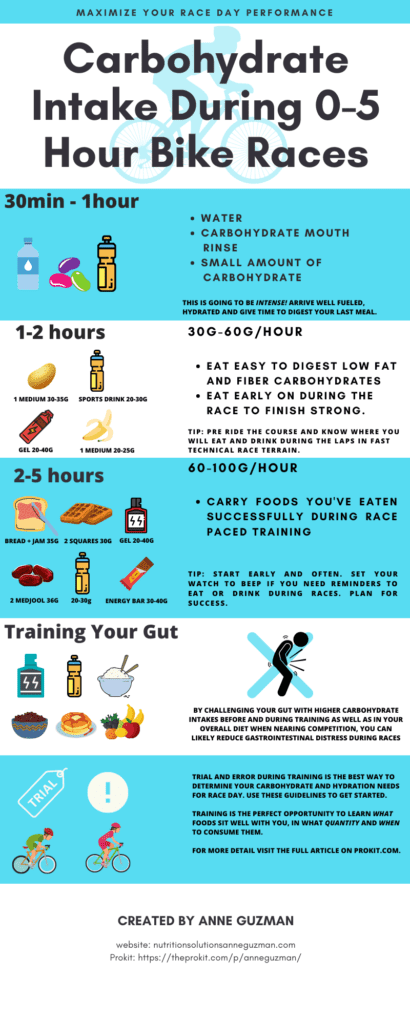Race vitamin is difficult, and realizing precisely what kind and the way a lot gas to soak up throughout a race can take some trial and error. Sports activities nutritionist Anne Guzman addressed this in a current weblog submit, and whereas her tips targeted on cyclists, they’re very relevant to runners. So, whether or not you could have a 5K or a marathon on the schedule, check out her recommendation to carry out your greatest on race day.

30 min — one hour
The primary class in Guzman’s infographic could be equated to a 5K-10K race for many runners. For these brief races, simply consuming water will doubtless be sufficient, offered you’ve eaten effectively the night time earlier than and the morning of the race to make sure your glycogen shops have been topped up.
If you happen to’re working a 5K on a temperate day, for instance, merely consuming some water earlier than the race and re-hydrating afterward will probably be satisfactory — no mid-race drink obligatory. On a sizzling day, you could need to think about grabbing just a few sips of water from the help station, however even then, so long as you’re well-hydrated going into the race, you doubtless gained’t want a lot whilst you’re working.
As your race will get longer (as much as an hour), Guzman says carbohydrate mouth rinses may help “decrease our notion of ache and/or ship messages to muscle mass resulting in further recruitment of muscle fibers,” though, she admits, the mechanism behind how this works continues to be considerably unclear.
Equally, she says consuming a small quantity of carbohydrates within the type of a sports activities drink or a gel with water may help enhance efficiency as your race will get a bit longer. Nonetheless, in case your race is lower than one hour, this further carbohydrate isn’t essential to your efficiency, and runners ought to be cautious to solely do what they’re comfy with/what they’ve practiced, to stop abdomen points.
10K — half-marathon

In case your race is lasting longer than an hour, taking in carbohydrates through the race turns into extra essential for delaying fatigue and enhancing efficiency. Whereas Guzman makes just a few totally different recommendations for cyclists, runners finishing these distances ought to most likely keep on with sports activities drinks and gels, since working generally is a bit tougher in your abdomen than biking.
Guzman suggests taking in 30-60 grams per hour, from both a single carbohydrate supply (like glucose) or a combination (like glucose, sucrose and fructose). No matter carbohydrate supply you select, ensure you eat it earlier within the race so your physique will have the ability to use it within the latter phases when fatigue is beginning to set in.
Marathon and up

As skilled marathon runners know, your mid-race gas could make or break your efficiency, since runs of this length surpass the quantity of carbohydrates your physique can retailer. To have success in occasions lasting longer than two hours, it’s essential that you simply go into the race with a fuelling plan, and that you’re strict about sticking to that plan.
Most consultants advocate taking in about 60 grams of easy-to-digest carbohydrates per hour throughout a marathon. Once more, not like cyclists, marathoners ought to keep on with drinks, gels and chews to get their carb repair, since these are usually simpler in your digestive system (to not point out they’re simpler to hold with you, as effectively). After all, when you transfer up into the world of ultrarunning, you’re going to want much more carbohydrates to get you to the end line, and runners in these occasions can begin to add denser meals, like potatoes, waffles and power bars into the combination.
The fuelling methods for marathoners and ultramarathoners typically look fairly totally different, however they’ve one factor in widespread: runners should follow them earlier than their race. Abdomen points can break your efficiency on race day, so it’s essential to follow forward of time to know what works and doesn’t be just right for you.

